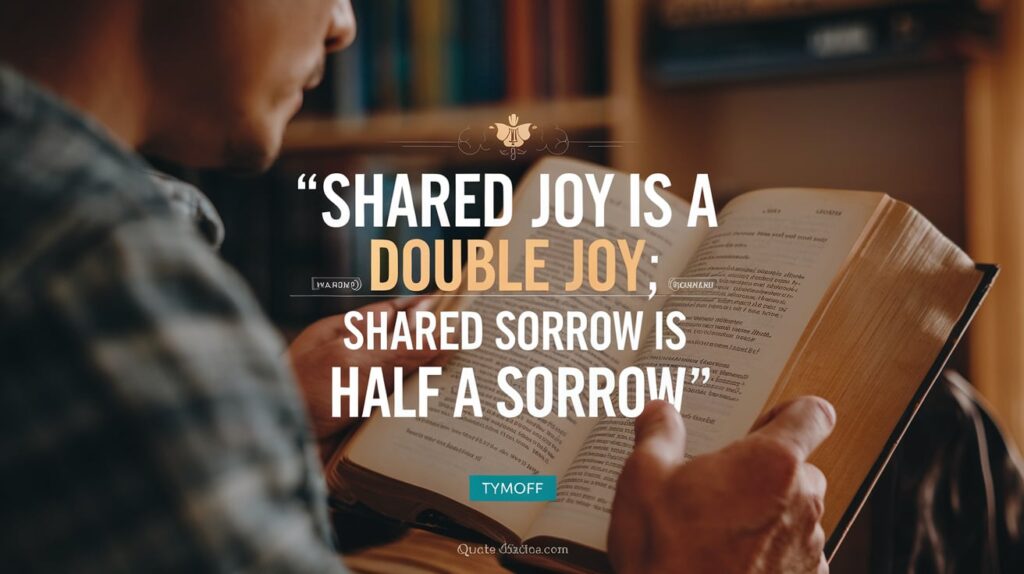Many people hear the phrase “shared joy is a double joy; shared sorrow is off” and will identify with how important human interaction and our abilities for empathy truly are. In other words, it highlights emotional experiences, be they glad or sad times as though multiplied in worth when shared by another. Let’s look closer at how this proverb influences our understanding of emotional connections, why sharing both joy and sorrow is essential to us, and what we could learn from such a simple yet very profound saying.
The Power of Shared Joy
One of the most powerful emotions we can have is joy. It might be achieved through almost any moment, achievements, celebrations, or just moments of pleasant contentment. But as with all things, shared power always makes it bigger. “Shared joy is double joy” is more than just a great saying-it’s an expression of what science and psychology find about positively interacting with other people.
Amplifying positive emotions
Whatever small or big victory we feel, sharing it with somebody—a family member, a friend, or a colleague—automatically enhances emotions. It’s not only the reminiscence of that moment or time spent with somebody; it helps cement the connection and share happiness. And in return, the shared happiness turns into a reservoir that helps both of them feel better and connected. Actually, research in psychology has shown that happiness can multiply exponentially when shared with others. Such moments of collective joy help cement relationships, deepen trust, and create lasting memories.
Celebrating Together Builds Stronger Bonds
Consider the act of celebrating a birthday, a graduation, or a new job. The feeling of joy reflects not only on personal achievement but extends to the enjoyment of others around you. Joy is infectious. Laughter and shared smiles with collective excitement create a bond of strength not only between you and others but even in the act of joy. When we experience joy along with others, we are, in a sense, creating a web of positive energy that connects people, making more meaningful and lasting relationships.
The Power of Shared Sorrow
On the flip side, “shared sorrow is off” articulates an emphatic statement that alleviates weight to bear through emotional pain doing so. Such expression “tymoff was used interchanged as the form that is normally taken “half a sorrow so there was gross distortion, however, it seemed fairly apparent to anyone what meaning was being conveyed as if to one’s self regarding expressing that form of thought-sorrow is lighter to some extent and less burdensome when shared amongst others with.

Reducing Emotional Ache Through Sharing
Sorrow, as much as it is a heavy emotion, is just as much as it is when experienced with joy. It can stem from personal loss, disappointment, or unexpected trials. But what makes the load lighter is if one shares such sorrow with trusted friends, relatives, or a supportive community. Talking through difficulties, whether an open conversation or simple companionship, helps offer emotional support and comfort, then perspective. Let someone share your grief, and that is in itself a kind of helping carry the burden.
Healing through Empathy and Compassion
Empathy is at the core of all these. When other people can identify with your sufferings, they make you feel less alone. The knowledge that someone understands or has walked the same path makes you feel united. This can be accompanied by emotional healing and rejuvenation. Man essentially happens to be a social being, and at the time of suffering, expression with other human beings is the first aid towards recovery. It ensures that one is not alone in pain and that help is nearby.
Why We Need to Share Both Joy and Sorrow
In the light of this proverb “shared joy is a double joy; shared sorrow is off,” one realizes that emotional life is not private to be confined to but essentially, interconnected with social life and relationships. Conjoint enjoyment of both happiness and sadness adds brilliance to human life and makes human relationships even stronger as the building blocks of our emotional lives.
Mutual Emotional Response and Support
Opening ourselves to other people, when we are in either happiness or sorrow, actually means inviting an emotional exchange to reciprocate. It forms a space in which people take their turns to provide each other with joy and comfort. In the process, we are enriching our relationships with other people. The proverb tells us that sharing is more rewarding and easier when emotional experiences come about. Joy is more joyful when shared; sorrow is also easier to bear when people share it as well.
Building a Support Community
At the heart of this thinking is the idea of community. In whatever community may take on, whether through family, through friends, or through a network of social relationships shared emotions provide the basis of any supportive community. This lightens the whole room from just one candle; similarly, this is how the sharing of even a single experience of happiness or sorrow with that person lights the life of many and gives them what they require inspiration and emotional power for their life. It is by relationships that people will be able to ride the ups and downs of life as such connections show them the support they need during the trying moments and accompany them to share in merriment when life happens to be joyful.

How to Practice the Wisdom of Sharing Joy and Sorrow
Although the proverb is simple, it offers very practical advice on how to improve our relationships and emotional lives. Here’s how you can embody that wisdom, “shared joy is a double joy; shared sorrow is off”:
1. Be Open About Your Emotions
Do not hesitate to share your joy with people around you. It could be a promotion at work, achieving a milestone, or simply something about yourself that has reached a personal level. Let friends and family know the happiness. When things are tough, though, do not bottle it inside. Share the struggle with people you can trust. In this way, it will not only ease the emotional burden but also deepen your connection with other people.
2. Practice Empathy
Show others your joy and grief, the peace and ease of others by being active with listening and empathy. Help those who are struggling with life; when it is your turn to be happy because of their advancement, celebrate with them, for then you are going to help them understand that you can really feel for them.
3. A Culture of Sharing
Share the emotion of happiness or sadness with friends, family, or colleagues. Such are the circumstances in which more vibrant relations may be expressed, and deep bonds of a community are fostered.
Conclusion: The Feeling of Connection
The saying “shared joy is a double joy; shared sorrow is off” captures the sense of human bonding at its core. Joy becomes much more meaningful if shared with others, and sorrow feels less heavy when it is carried together. Through sharing, we build empathy, compassion, and stronger relationships, which enrich our lives and offer a profound sense of fulfillment. Whether you are celebrating a victory or navigating a challenge, the value of sharing your experiences with others cannot be overstated.
The next time you happen to feel a twinge of joy or pain, remember this: don’t keep it inside. Share it. It is in that sharing that you’ll find your joy magnified and your sorrow softened, as “shared joy is a double joy; shared sorrow is off.”

